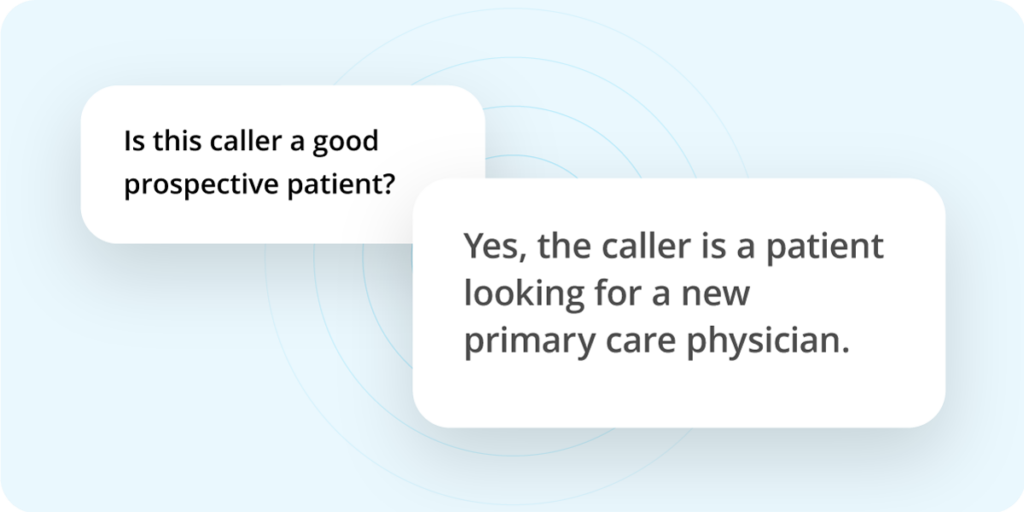Conversational AI in Healthcare: 5 Top Uses
How to Use Conversational AI Tools in Healthcare
Healthcare professionals everywhere are learning how valuable conversational AI in healthcare truly is. Conversational AI tools used in healthcare can make a difference for both patients and providers alike delivering better patient experiences and lightening the load for overworked healthcare professionals.
Nowhere is the glaring shortage of workers more obvious than in the healthcare industry. Today’s healthcare professionals are working longer hours in short-staffed facilities and are responsible for more than ever before. Hiring more workers isn’t always in the budget, and even when it is, finding qualified healthcare professionals is a challenge.
Conversational AI in healthcare can help to ease the burden on this strained system and provide improved healthcare and processes for patients. A win-win all around. If you’re a healthcare professional and not sure how conversational AI can help, read on and learn about three ways conversational AI in healthcare can help improve your patients’ experiences and support your team to do more with less.
1. Create exceptional patient experiences
Most people experience a bit of fear or apprehension when seeking medical care–even if it’s routine. Conversational AI in healthcare can help to alleviate this anxiety about medical appointments and procedures. Conversational AI powers virtual agents and enables them to engage in meaningful conversations with patients and effectively accomplish tasks like:
- Provide answers to routine questions
- Send ‘‘what to expect’ information before appointments and procedures
- Prompt a trigger to send medication reminders
Patients can get immediate, reassuring answers to all their questions–24/7– and regular reminders, and healthcare workers have more time to focus on critical cases.

2. Ease load on overworked staff
Speaking of more time for healthcare workers, many AI-powered tools like virtual agents can take over tedious, time-consuming tasks freeing them up to work on more urgent needs. Conversational AI tools support healthcare workers and ease their heavy load. A few ways include:
- Collect patient information like insurance, medical history, and medication allergies
- Triage patients by symptoms and send them to the appropriate point of contact
- Schedule appointments and send appointment reminders
Instead of healthcare staff spending hour upon hour on the phone to collect information, confirm appointments, and sort through which call needs to go where this can all be accomplished automatically. What’s more, many of these virtual agents are able to handle multiple interactions at the same time. This gives teams back even more time to work with patients with more complex matters.
3. Improve long-term outcomes
Most people have heard many times about the sad state of health in Western countries like the United States. This poor health is due to many factors but having proper access to the right healthcare is crucial to improving long-term health outcomes. Conversational AI in healthcare can help do this too.
As mentioned, these AI-powered tools are able to consistently communicate with patients. Many healthcare organizations utilize these tools to help keep patients informed, check in with them, and be sure they are on track with their appointments, testing, medications, and more. When patients are being reminded and checked up about health-related goals and issues, they’re more likely to stick to their doctor’s plan.
Conversational AI tools in healthcare can be used for:
- Medication reminders
- Appointment reminders
- Health status tracker and alerts
- Health tools tracker and alerts
There are endless possibilities with AI-powered tools and the capabilities of these tools continue to grow.

4. Reach more patients
There is a great need for good healthcare. Conversational AI not only helps to create better patient experiences it can help healthcare marketing teams reach more potential patients. Conversational AI tools can be used to gain deeper insight into your patient. They can extract, summarize, and highlight key information from caller conversations, chats, and texts.
Marketing and sales teams get a clear understanding of what their best-fit patients are talking about and what they need–all at a glance. Tools like CTM’s HIPAA-compliant AskAI immediately summarize call data, determine sentiment and intent, and answer custom-selected questions like:
- Is this caller a good prospective patient?
- What was the outcome of this call?
- Did the call result in a scheduled appointment?
- Was the caller asking about an existing condition or a new issue?
- Was insurance mentioned? If so, which type do they have?
Using this first-party data leads to a better understanding of what keywords your patients are using, which marketing messages and campaigns are grabbing their attention and getting them to take action, which specific ads are working best, and where they’re interacting most with your brand. This helps marketers know where to focus their ad spend but also, how to reach patients who would be a good fit for your healthcare practices.

5. Maximize Revenue Cycle Management
Providing great care and improving individuals’ health and well-being are great goals, but healthcare providers need to get paid too. Conversational AI tools can support your revenue cycle management. From sending billing reminders to providing follow-up communications, conversational AI in healthcare can help to make your revenue cycle management system more efficient and effective.
Billing teams won’t waste hours calling to remind patients their payments are due, and patients will have easy access to any follow-up care they may need. For example, if a patient has a broken leg, once their cast is off, conversational AI tools can prompt a text message to help them schedule physical therapy.
This isn’t just more convenient for patients, it also leads to better outcomes and saves teams time, and helps to re-engage patients with more relevant services they may benefit from after their initial treatment has concluded.

Conversational AI in healthcare is a must if you want to do more for your patients and ease the stress on your teams. Conversational AI tools and their capabilities vary from one platform to the next so be sure you know what your goals are, what tools will help you meet them, and which KPIs you’ll use to measure your success.
Learn more about how AI-powered tools can help your healthcare organization’s marketing efforts.